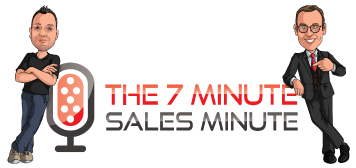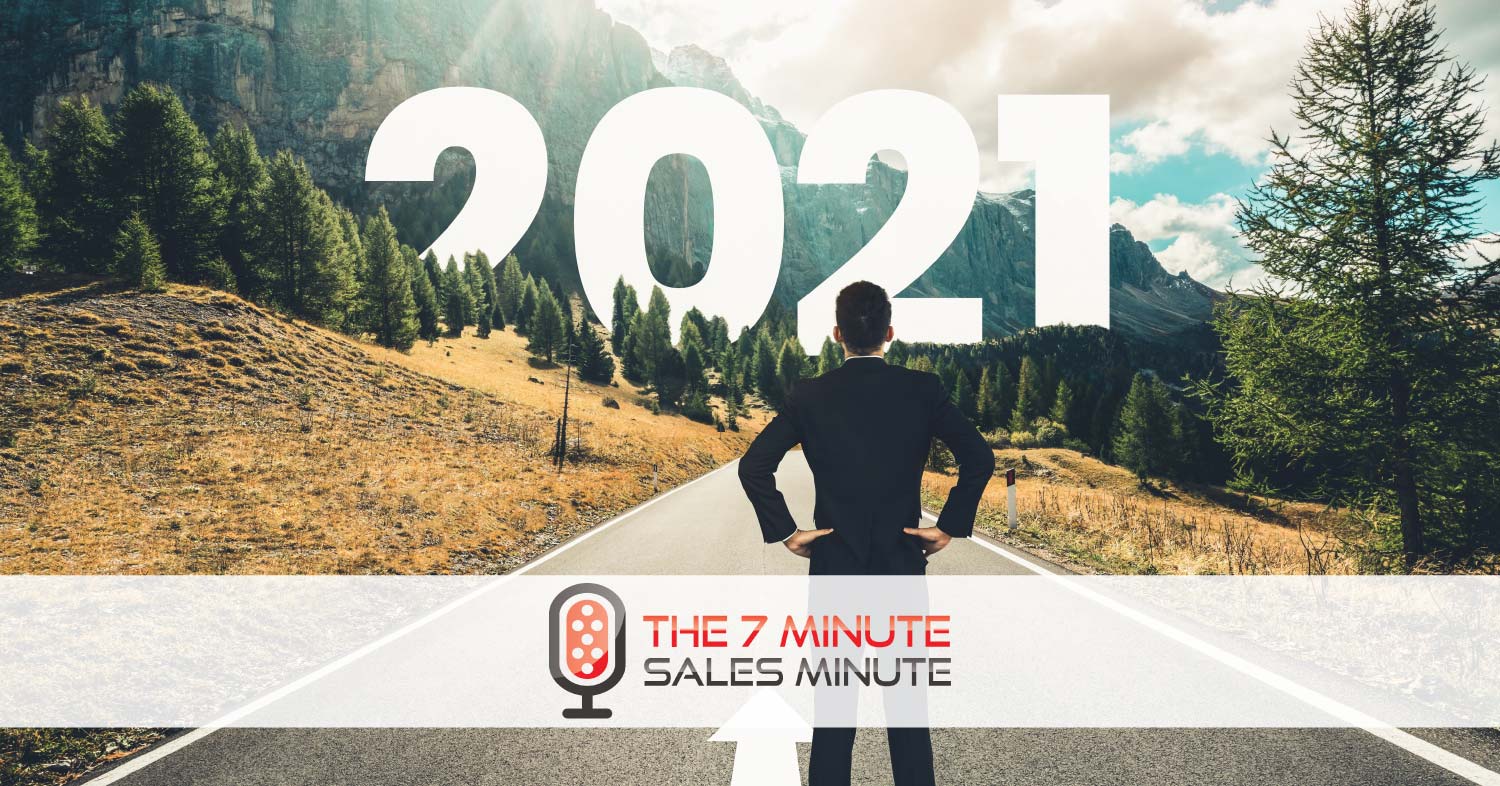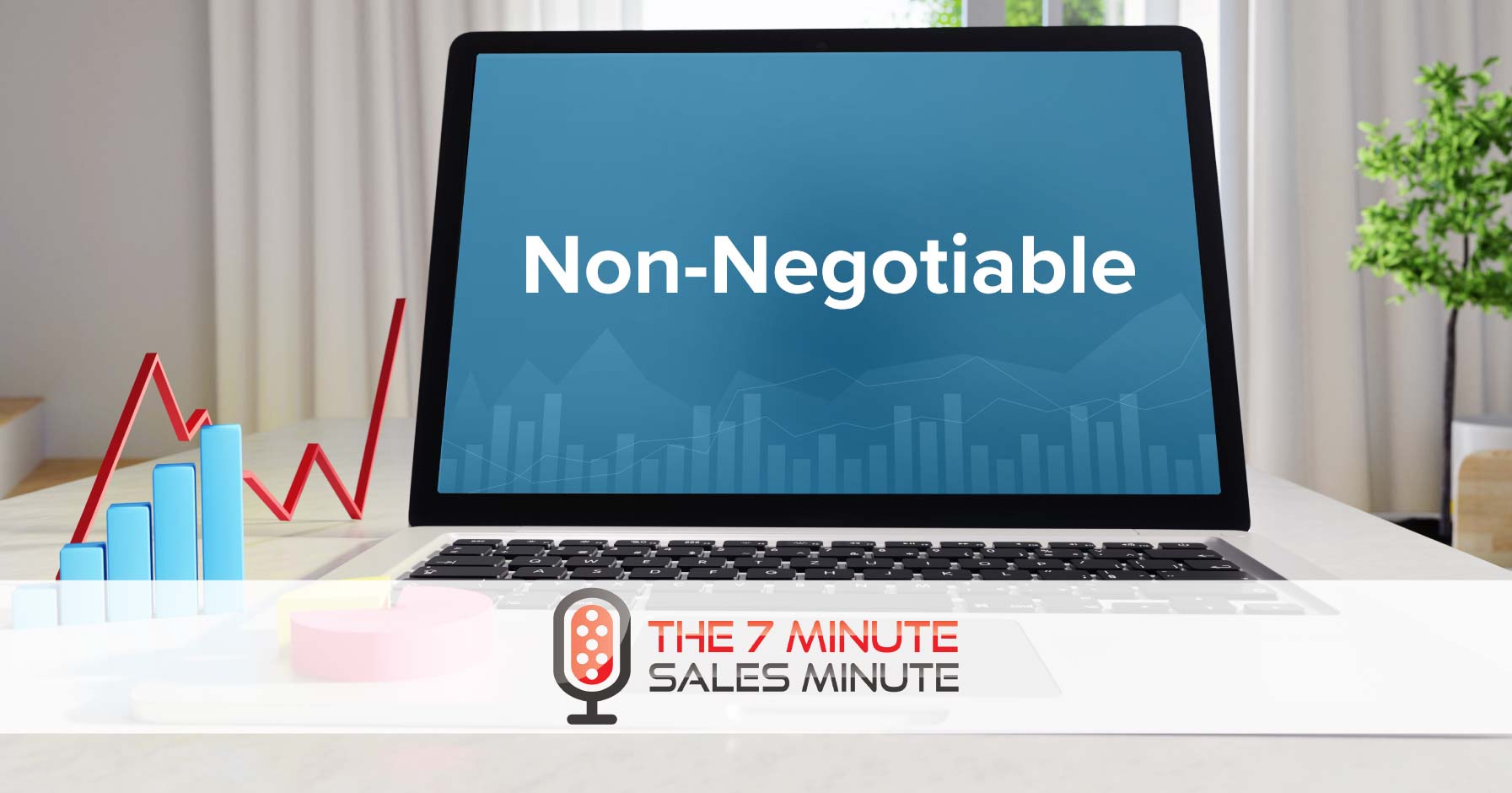
Hosts: Jon Dwoskin & Scott Fishman.
Read the transcript
Thank you for joining us for another episode of The Seven Minute Sales Minute podcast, your bite-sized and easy-to-digest guide to jump-starting your sales career and putting you on the road to gaining more prospects, more clients, more business, and ultimately, more income.
Scott: Good morning, Jon.
Jon: Scott, good morning. How are you today?
Scott: I’m doing great and ready to record a podcast with you.
Jon: I am, too. I am, too. It’s a great day, and I think we had a lot of great things to talk about today. And, I’m going to encourage all of our listeners to grab a pen and paper, and take a couple notes that I think will help them through these next couple months that we’re going to talk about which are getting over the holiday slump. What do you think about that?
Scott: I think that’s great, and I think the holiday slump actually is a myth perpetuated by the greeting card companies.
Jon: I would agree with that. I would agree with that, and then people owned it, and then people get … I don’t know any other word to use, but they get a little lazy. The average American gains eight pounds from Thanksgiving to Christmas, so this is a workout plan for the mind and the business.
Scott: Are you serious? Eight pounds?
Jon: Eight pounds.
Scott: You didn’t make that up?
Jon: No, it’s a stat. You can Google it.
Scott: Wow. A human head also weighs eight pounds.
Jon: Then, everybody is gaining whatever their head weighs from Thanksgiving to Christmas.
Scott: There you go.
Jon: I think today … in today’s episode, we need to give attribution to our boy George Doran. Do you know who George Doran is?
Scott: As a matter of fact, I do, Jon.
Jon: Tell our listeners who he is.
Scott: Well, because we just looked it up.
Jon: Yeah, that’s true.
Scott: George Doran …
Jon: What did you learn about George Doran?
Scott: George Doran in the 1980’s created SMART goals. I’ve been using SMART Goals for years. I just had no idea that a gentleman by the name of George Doran actually created them, so what we’re going to do is with …
Jon: Thank you, George.
Scott: Yes, absolutely. With 25 business days left to our bookend that we’re talking about which would be December 21st?
Jon: Correct.
Scott: With 25 business days left before December 21st, today, what we want to do is create SMART goals. I’m going to break down SMART very fast for us. SMART goals are specific. Meaning, you are targeting a specific area that you want to improve. Measurable, you should be able to quantify or at least suggest an indicator of progress with your goals. They should be achievable. You shouldn’t set a dream or a super stretched goal. We want you to be realistic and actually set a goal that you can hit. Your goals should be relevant. Meaning, these goals must be directly related to working on or in your business when you set them, and they should be time-sensitive, which you should have a specific end day in mind. In our case, it’s going to be December 21st of what we’re talking about.
Jon: Well said.
Scott: Thank you.
Jon: We changed it a little bit from George, but still highly relevant. Just to break it down to our listeners: specific, measurable, achievable, relevant, time-sensitive.
Scott: Correct.
Jon: All right. Let’s dive a little bit deeper into that now and figure out what we got to do the next 25 days. I think it is critical that everybody change their mindset away from this … Fish, I know you said the greeting card mindset that the next 25 days are the most important 25 days of your career. You’re ramping up in getting your first quarter of 2016 ready to go. You’re allowing yourself to have a relaxing Christmas and first year of 2016 where you don’t have to basically kill it when it’s just basically … you want to be with your family. Thoughts on that?
Scott: No, I agree. This is something that years ago, when I first started in sales, I … I’m going to be honest. I’m lazy by nature. You’ve known me for years, and the one thing that … if someone said, “Hey, you don’t have to work today,” I probably wouldn’t work today. That’s how I used to be, and what I’ve noticed is that we give ourselves that excuse of, “It’s the holidays.” When I first started years ago doing mortgages, there was like a specific date, and I think it was pretty much right around the week of Thanksgiving where it was party season would start. There would be a title company that would throw a party, and we’d all go, and eat their food, and have drinks. We’d leave work at 4:00 because, of course, it’s the holidays. There’s nothing to do. There’s no client coming in. Then, an appraisal company would have a party, then we would have a party, then another title company, and the parties just never stopped, so we always had an excuse to leave the office and not work. Of course, in our minds, we said, “It’s the holidays. No one really wants to do business.” But, that’s not true.
Jon: Correct.
Scott: I think that we actually can find ways to do business and by ramping up our own efforts at a time like this, we can actually win and actually get ahead of our competition in our specific jobs.
Jon: Right. I agree. Get a competitive edge. Stick to a realistic, yet competitive … test yourself and really front-load right now. It’s about really figuring out what you wanted, then reverse-engineering that plan for, specifically, the next 25 days. I just want to make quick mention, too, that in future episodes, we’re going to be talking about how to put together the ideal 2016 business plan, so stay tuned for that.
Scott: Correct. Now, – Jon, you touched on something there, and I want you to elaborate a little bit. You said, “Front-load.” Why is that?
Jon: Correct. You got to figure out, so in the next 25 days you need to do 45 days’ worth of work or 35, 45 days’ worth of work because … so you got to figure out what really needs to get done, and you got to do more in the beginning because as you get closer to the holiday season, I think we’re all just human, we’re going to innately slow down a little bit, so the first, let’s say, 15, 20 days, for sure the 15, you want a heavy load and do the bulk of your goals that we want to put together today. Not that we want you to coast, but we want you to really take advantage of the time before you start even thinking about getting lazy.
Scott: Right, so you’re saying basically, your business will taper off, so we want it to start … if it’s a pyramid, you want to start at the wide-end of the pyramid and slowly taper it off towards the end of this 25-day cycle. I think that makes perfect sense.
Jon: Start with a bang. Let’s break down some goals.
Scott: Right.
Jon: Okay.
Scott: On past episodes, we talked about key performance indicators, and what it takes, and what your metrics should be, so I think the big thing to do to start off is to figure out where you want to end up.
Jon: I agree, I agree. What are the results that you want? Where do you want to be 25 days from now? Answer that question. What needs to happen for you to get the results?
Scott: Right. When we’re setting goals, what is your vision for where you want to set? December 21st, when you’re ready to kick your feet up for the holiday week, where do you want to be, and what is the number you need to hit?
Jon: Right. And, what does your pipeline need to look like?
Scott: Exactly.
Jon: We’re all salespeople, and we are driven by what our pipeline looks like. If we have a weak pipeline, then we’re going to make less money. If we have a heavy pipeline, we’re going to make more money, so you should have specific goals and what that pipeline is going to look like December 21st.
Scott: Exactly. Let’s just say, for myself, if I want to be at 50 clients, it’s an easy number for us to divide it out.
Jon: Okay.
Scott: If I want to be at 50 clients by the end of this cycle here on the 21st, I need 25 business days, that’s two a day.
Jon: Okay.
Scott: In order to get two clients a day, how many people do I need to talk to? We need to track those every single day, and that’s something that ties down to, “Now, wait. We have our specific goal in mind, right?”
Jon: Correct.
Scott: It’s measurable. I can measure how many clients I’m achieving each day. It should be achievable. I can do that. I’ve done it before. I’ve achieved … I’ve brought on 6, 7, 8, 9 clients in a day, so just having to do two a day is not that difficult. We’ve got the first three right there, specific, measurable, and achievable.
Jon: Perfect. All right.
Scott: I believe that these goals are relevant. They really are. It’s relevant to my business. If I need to get … this is where I need to be, I’m there and time-sensitive.
Jon: I like it.
Scott: Very easy. Twenty-five days, 50 clients. It’s right there, so I’ve just set a SMART goal for myself.
Jon: Right, and I just want to specify something. SMART goals don’t have to be complicated. These are as easy as you just broke it down: 1-2-3. You take the most measurable part of where you can grow your business, and you focus on what you’re going to do to work on your business, not necessarily get stuck in the admin minutia in your business. And, that’s your goal. We’re not trying to make this over-complicated for everybody. You want to be tight, and specific, and laser-focused, and even maybe only one SMART goal that is a metric that you can measure and grow.
Scott: Right. And, what I will do from here is I’ll actually take this SMART goal and actually develop a little bit more of a plan. What I’ll do is I’ll look at the metrics that I’ve done and figure out how many clients I actually need to talk to and how many presentations I actually need to have in order to get that, so I can track it a little bit deeper. It’s not just so surface level, but I know at the end of the day, if it takes me ten conversations to achieve two clients, and I’ve got a 20% conversion there, I know that if I’ve only talked to seven people and I’ve brought one new client in, chances are, if I talk to three more people, I’ll be there. Again, like you talked about front-loading, if I know that I need to talk to ten people to create two new clients, I should be going for 15, 20 people per day in the beginning.
Jon: Per day, right.
Scott: The work I do now will get me ahead, so I’m not scrambling later. It will give me a stress-free environment come the December holidays.
Jon: Right, and you know that you’ll be finishing the year strong and starting the year in a positive nature.
Scott: Correct.
Jon: Right. Whether you’re basing it on calls, meetings, proposals – however you need to track – we’ll suggest take one or two of those and create SMART goals, so you can achieve what you need to achieve, but don’t get lazy. You got to commit to the SMART goal, and you got to commit to making it happen because the person next to you is going to make it happen. Your competitor is going to make it happen.
Scott: Exactly, and don’t say just because the person next to you decides that they’re going to be lazy. Don’t fall into that trap. You don’t need to. The average consumer still buys in the holiday season. They want to spend money in the holiday season. Their wallets are out. They don’t care what they’ve swiped on their credit cards or debit cards in this holiday season, so now is the time to strike with your clients. Don’t just assume they don’t want to do business, and don’t fall into the trap of, “Call me after the holidays.”
Jon: Right. I want to touch base on front-loading for a second too because I think sometimes you got to look at your specific day and front-load your day. Meaning, if you have the title company parties or whatever parties as a business that you’re going to, you need to say to yourself, “All right,” because they’re usually planned out. If you’re saying, “Hey, next Wednesday and Thursday, I have parties at 4:00, so I have to leave at 3:30,” that’s fine. But then, get into work the next … an hour earlier. Get your calls, get your meetings, do your proposals, do whatever you got to do. This is a really critical time to not allow yourself to have any excuses. It’s going to take a lot of discipline.
Scott: Absolutely, Jon. I can’t agree with that more. You have to have discipline during this time of year. After the first of the year, everybody has the new year’s resolutions, and everybody wants to actually fix their finances, lose weight. Everything comes into play. That’s why new year resolutions don’t work. It’s because we try to do everything all at once. But, if we can be the ones that get ahead during this time, you will win.
Jon: You will, absolutely. Small goals. Change comes in small doses. Like you said, I agree. I think average memberships for gyms go skyrocket in January, and then by March … I don’t know exact statistics, but by March, nobody is around. They’ve paid for their year membership, but they’re just not doing it. You can’t do too much at one time, so make these small changes and build your … I’ll say the holiday muscle of just rethinking the paradigm shift of how you execute during this time.
Scott: Right. At this point, folks, we want to say again a special thank you to all the new listeners that subscribed this week. We’ve gotten great feedback, and we want to tell you that we cannot thank you enough for all of the subscriptions and reviews that we’ve gotten on iTunes. We’re growing way faster than we ever expected, and this is great. Welcome. We hope that you are gaining insight and your business is growing by leaps and bounds just with our little podcast helping you along the way.
Jon: Right. I just want to say thank you to him. I’m so grateful. This has been an idea that Scott and I have wanted to do for a long, long time, and it’s a reality, and the feedback has been phenomenal. We love sharing information to help you all grow. If you could give us a review on iTunes, that would be great. And, thank you so much for listening. We really are grateful and appreciate it.
Scott: Thanks again. Have a great day.
Jon: Have a great week. Thank you for listening to this episode of The Seven Minute Sales Minute. For show notes and worksheets pertaining to this week’s show, check us out at the sevenminutesalesminute.com. Take today’s strategies and run with them. Increase your sales, and increase your income.




